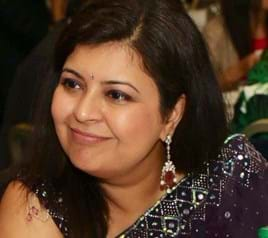“The Mary Seacole programme breaks you open and moulds you.”

Tulika Jha is a consultant psychiatrist at Hertfordshire Partnership Foundation Trust. In this blog, Tulika discusses how the Mary Seacole programme helped her to recognise the impact of her leadership style on others.
“What is it like to be on the receiving end of me?” It’s hard enough to understand how others make us feel, having an idea of how one makes others feel is a brave and humbling process but one that I’ve found worthwhile investing in through the Mary Seacole programme.
The beauty of the Mary Seacole programme is in the tailoring of the learning to the personality of each participant and the learning from the deep reflections of others. Their personalities become your text book.
This doesn’t mean that the programme is easy, far from it. The Mary Seacole programme breaks you open and moulds you – sometimes gently, sometimes not – and then rebuilds you into a wiser, better version of yourself. In this blog I’d like to share some of my thoughts on how the programme has helped me, in different aspects of my professional and personal life.
Being an outsider
I’ve always known that leadership is about relationships and having invested in personal therapy for years, I’ve not shied away from deepening the relationship with myself even when this has been painful.
The Mary Seacole programme helped me consider how as an immigrant I’ve internalised the ‘outsider’ experience and feelings that I don’t belong. There’s enough research indicating the lack of BAME professionals in senior leadership positions in the NHS so I knew this was not solely in my mind. However, for me to move forwards, I needed to shift my mindset to an adult consultant from the frightened little girl carrying the toxic feelings of not belonging in the playground, in the school disco or indeed any such activity that was distinct from my parent culture at the time. Until recently, I flitted furiously from rage to guilt and either passed up opportunities – believing that I’m wasn’t good enough – or becoming angry about being overlooked for certain opportunities such as senior management positions as a part-time worker. This led to acting out in ways that have put me in a more peripheral position, therefore ‘shooting myself in the foot’.
Since starting the programme, I’ve embraced the skills and resources I have as an able and skilled senior NHS professional with a rich experience of two cultures. I’ve put myself forward for lead roles in my organisation. I’ve faced feelings of ‘outsider-ness’ that have returned and resisted these instead of being swept away with old behaviours. Could I be eliciting this response due to my own mistrust in myself and the system? Am I testing others or myself? Am I sabotaging myself because I’m scared of the responsibility that comes with being an insider or fearful of letting go of the rage that I have held onto for being wronged for being different?
These are not easy contemplations to be had but they’ve helped me to consider my part in this dynamic and I’ve started to move towards feeling a part of my team and organisation. The response to this shift in my attitude and behaviour has been overwhelmingly positive and collaborative. I’ve since requested to undertake an important project, representing my organisation at college congress, putting myself forward as a BAME female role model and telling the CQC of all the hard work we have been doing to improve safety within our trust.
Conflicts and compassion
The Model of conflict resolution used in the Mary Seacole programme showed me the different positions we can take in situations of conflict, depending upon the importance of winning the battle and indeed whether the battle was worth fighting in the first place. The idea of self-compassion initially seemed to feel indulgent, but I began to understand the effects of small wellness routines such as mindfulness and walks during breaks in building my emotional resilience. I became better at forgiving myself. Conflicts were easier to manage because I was softer with myself and others – I was becoming more human and that for me is leadership at its core.
In today’s NHS, the Mary Seacole programme is an oasis of learning and change. The waters can get rough when your deeply ingrained beliefs are challenged but going through this is the only way to a satisfying,wise and sustainable day-to-day life. I would urge you to take a dip into leadership development and promise that you will be coming back for more.
Find out more and apply for the Mary Seacole programme.